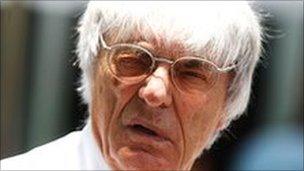F1's Ecclestone speaks at German banker's bribe trial
- Published

Mr Ecclestone has said he expects to be cleared of any wrongdoing
Formula 1 supremo Bernie Ecclestone has told a court in Munich that he paid a former banker to avoid a potentially costly tax investigation.
The ex-banker, Gerhard Gribkowsky, on trial in Germany, stands accused of corruptly accepting the money when the sport was sold in 2006.
But Mr Ecclestone has denied the payment was a bribe.
"I had no alternative at the time," Mr Ecclestone, who has immunity for his testimony, told the court.
While immune for his testimony, he could still be prosecuted for any actual wrongdoing. He has said that he is confident he will be exonerated for paying the banker.
'Keep calm'
In court on Wednesday, Mr Ecclestone said that he was worried that, if he did not pay, Mr Gribkowsky would alert the UK tax authorities to "things" that might lead to a tax inquiry.
"The only alternative was that the British tax authorities followed a case that would have been very expensive for me," he said.
"The tax risk would have exceeded £2bn," said Mr Ecclestone. "I paid him to keep calm and not to do silly things. I knew he wanted to start a business."
The allegations revolve around the sale of BayernLB's stake in Formula 1 to private equity group CVC Capital Partners, which still owns the commercial rights to the sport.
In return for the payment to Mr Gribkowsky, who was in charge of the sale of German bank BayernLB's stake in F1, prosecutors allege Mr Ecclestone received $41.4m in commissions from the bank, as well as a large payment to a family trust.
In July, Mr Ecclestone told the Daily Telegraph, external that he paid $44m (£27m) to the former banker in 2006, but denied the money was a bribe.
Private equity firm CVC bought majority control of F1 from Bernie Ecclestone's family trusts and a group of investment banks.
Mr Ecclestone remains F1's chief executive and retains a large shareholding in the sport.
He is scheduled to testify further in the trial on Thursday.